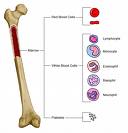Bone Marrow Transplant Could Cure AIDS
 A German doctor said that a patient suffering from leukemia and infected with the immunodeficiency virus that causes AIDS could be cured of the virus. A bone marrow transplant from a donor who had a genetic resistance to the virus is said to be the cure.
A German doctor said that a patient suffering from leukemia and infected with the immunodeficiency virus that causes AIDS could be cured of the virus. A bone marrow transplant from a donor who had a genetic resistance to the virus is said to be the cure.
Dr. Gero Hutter and Thomas Schneider of the Clinic for Gastroenterology, Infections and Rheumatology of the Berlin Charite hospital reported that a 42-year-old American living in Berlin, is free of HIV virus after he received a transplant at their clinic two years ago as seen in tests on the man's bone marrow, blood and other organ tissues.
The bone marrow donor who was selected had a genetic resistance to most strains of HIV. The bone marrow transplantation was aimed to get more HIV resistant cells in the patient. The patient since the transplant has taken no anti-retroviral drugs, the doctors reported.
In a statement, Berlin’s Charite hospital said, “More than 20 months after the successful transplant, no HIV can be detected in the patient.” Dr. Thomas Schneider of the Clinic for Gastroenterology, Infections and Rheumatology of the Berlin Charite hospital told a news conference, “We performed all tests, not only with blood but also with other reservoirs.”
The mutated gene, called Delta 32, prevents HIV from attaching itself to cells by blocking a receptor called CCR5. Experts feel that this may be an exceptional case and further investigation is needed to determine exactly what removed the HIV virus.
Professor Rodolf Tauber, Berlin's Charite clinic said that this "therapy" is only for a very few lucky HIV patients. Mutation is rare to find occurring in one out of 1000 Europeans and Americans and finding a matched bone marrow with the mutation is very difficult.
Professor Andrew Sewell, University of Cardiff said that using gene therapy to knock out the mutation of the key CCR5 receptor could be possible as a future treatment.
According to UNAIDS, two million people die of AIDS each year and about 33 million people worldwide are infected with the virus with 2.7 million new cases reported in 2007. Sub-Saharan Africa remains the epicenter of the global malady with over three quarters of these deaths occurring here.